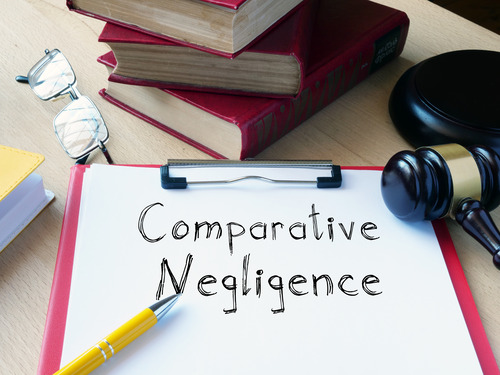At Mogy Law Firm, we are relentless in our commitment to protecting the rights of the injured and the accused. We believe in a client-first approach, offering personalized attention, clear communication, and aggressive representation in personal injury and criminal defense cases. Unlike many firms, we keep personal injury attorney fees at just 25%, ensuring our clients retain more of their rightful compensation. Whether you’re fighting criminal charges or seeking justice after an accident, our experienced team is dedicated to securing the best possible outcome for you.
Determining fault in a personal injury case is critical to understanding how much compensation an injured party can recover. Many states, including Tennessee, use comparative negligence laws to assign a percentage of fault to each party involved in an accident. This legal rule affects a plaintiff’s ability to collect damages, especially if they share responsibility for their injuries sustained.
In this blog, we explain how comparative negligence laws impact personal injury cases in Tennessee and why working with an experienced Memphis personal injury lawyer is crucial for protecting your rights, minimizing fault, and maximizing compensation.
What is Comparative Negligence?
Comparative negligence is a legal rule used in personal injury cases to determine how fault for the accident is shared when more than one party is responsible. This rule affects how much a plaintiff can recover in damages based on their level of negligence in causing the incident.
Explanation of Comparative Negligence Laws
Comparative negligence laws assign a percentage of fault to each party involved in an accident. The injured party’s plaintiff’s damages are reduced by their degree of fault. For example, if a plaintiff contributed 20% to the accident and their damages sustained total $100,000, they can only collect compensation for 80% of that amount.
Difference Between Pure and Modified Comparative Negligence
There are two main types of comparative negligence: pure comparative negligence and modified comparative negligence.
- Pure comparative negligence allows a plaintiff to recover damages even if they are 99% at fault. Their percentage of fault simply reduces the amount they receive. Only a few states follow this rule.
- Modified comparative negligence places a fault threshold—typically 50% or 51%. If a plaintiff’s percentage of fault meets or exceeds the limit, they are barred from recovery. Tennessee follows the 50% rule, meaning a plaintiff can recover damages only if their degree of fault is below 50%.
How Comparative Negligence Affects a Plaintiff’s Ability to Recover Damages
The percentage of fault assigned to a plaintiff directly impacts how much they can recover in damages. If a plaintiff contributed to the accident, their compensation is reduced proportionally. Insurance companies often use comparative negligence arguments to shift more liability onto the injured party, reducing the amount paid out in settlements.
Modified Comparative Negligence in Tennessee
Tennessee follows a modified comparative negligence rule, which means an injured party can recover damages sustained only if they are less than 50% at fault for the accident. If a plaintiff’s negligence reaches this threshold, they are barred from recovery.
Tennessee’s 50% Rule
Under Tennessee law, a plaintiff can recover compensation only if their degree of fault is less than 50%. If the plaintiff contributed 49% or less to the accident, they can still recover damages, but their percentage of fault will reduce their total award. If their percentage of fault reaches 50% or higher, they lose the right to collect damages.
For example, if a plaintiff’s percentage of fault is 40% and their damages sustained total $100,000, they can only recover compensation for $60,000. However, if their degree of fault rises to 50%, they receive nothing under Tennessee law.
What Happens When a Plaintiff Contributes to an Accident?
If a plaintiff contributed to an accident, their liability affects their ability to recover compensation. The court or jury evaluates evidence, including police reports, witness statements, and traffic laws, to determine each party’s responsibility. The defendant and insurance company may argue that the plaintiff failed to exercise reasonable care, increasing the plaintiff’s percentage of fault and reducing the potential payout.
When a Plaintiff is Barred from Recovery
A plaintiff is barred from recovery when their combined negligence equals or exceeds 50%. This rule prevents one party from recovering damages if they are found equally or more responsible than the other party. Defendants and insurance companies often try to increase a plaintiff’s assigned fault to avoid paying a settlement.
For example, in a two-driver accident, if Driver A runs a red light but Driver B is texting and fails to stop, the court may assign 50% fault to each. Because Tennessee follows a modified comparative negligence rule, neither driver can collect compensation for their injuries caused in the crash.
Proving Fault in a Tennessee Personal Injury Case
Proving fault in a Tennessee personal injury case is critical for determining liability and recovering damages. Courts and insurance companies examine evidence to assign a percentage of fault to each party involved in the accident.
How a Plaintiff Must Prove the Defendant Failed to Exercise Reasonable Care
A plaintiff must prove that the defendant failed to exercise reasonable care, directly causing the injuries sustained. This means showing that the defendant’s actions violated traffic laws, safety regulations, or general duty of care. The plaintiff must provide evidence that the defendant’s negligence was a primary cause of the accident.
The Role of Evidence in Determining Liability
Courts rely on strong evidence to establish fault for the accident. This includes police reports, eyewitness testimony, surveillance footage, medical records, and expert opinions. The insurance company and the defendant’s attorney will attempt to shift blame to the plaintiff, making clear and compelling evidence essential.
How Insurance Companies Dispute Fault
Insurance companies often challenge the plaintiff’s claims by arguing that the plaintiff contributed to the accident. They may use comparative negligence laws to reduce compensation by increasing the plaintiff’s assigned fault. If the plaintiff’s percentage of fault reaches 50%, they are barred from recovery under Tennessee’s modified comparative negligence rule.
Challenges in Comparative Negligence Cases
Comparative negligence cases present unique challenges that can affect a plaintiff’s ability to recover compensation. Insurance companies and defendants often use this rule to minimize payouts, making it difficult for injured parties to secure fair damages.
Defendants Often Argue the Plaintiff Was Partially Responsible
In comparative negligence cases, the defendant will try to prove that the plaintiff contributed to the accident. By increasing the plaintiff’s percentage of fault, the defendant can reduce their own liability. If the plaintiff’s negligence reaches 50% or more, they are barred from recovery under Tennessee law.
Insurance Companies Use Fault to Reduce Payouts
Insurance companies aggressively dispute fault assignments to lower settlement amounts. They analyze evidence, look for inconsistencies in statements, and use comparative negligence laws to reduce the plaintiff’s compensation. Without strong evidence, a plaintiff’s claim may be undervalued or denied.
Proving a Fair Percentage of Fault is Difficult
Determining the correct degree of fault requires clear evidence, witness testimony, and legal arguments. If a plaintiff’s percentage of fault is inflated by the defendant or the insurance company, their recovery is limited or barred completely. Establishing true responsibility is crucial to securing fair compensation.
Cases with Multiple Responsible Parties are Complex
When multiple parties are involved in an accident, assigning liability becomes more complicated. Each party’s degree of fault must be determined, which affects how damages are divided. If a plaintiff is partially responsible, they must prove that their fault percentage is low enough to recover compensation.
Why Legal Representation Matters
Legal representation is essential in comparative negligence cases to protect a plaintiff’s rights and ensure they recover fair compensation. Without an attorney, insurance companies and defendants may shift blame, reducing or eliminating the plaintiff’s recovery.
The Complexity of Comparative Negligence Cases
Comparative negligence laws require a detailed analysis of fault percentages and liability evidence. A plaintiff must prove that their degree of fault is below 50% to recover damages in Tennessee. Defendants and insurers often argue that the plaintiff contributed more to the accident, making legal guidance necessary.
How Attorneys Help Plaintiffs Prove Liability
A personal injury attorney gathers evidence, consults experts, and challenges fault assessments that unfairly reduce compensation. They present witness testimony, accident reports, and legal arguments to show the defendant failed to exercise reasonable care. Without legal representation, plaintiffs may struggle to counter insurance company tactics.
Minimizing the Plaintiff’s Percentage of Fault
An attorney works to limit the plaintiff’s assigned fault, increasing the recoverable compensation. Insurance companies often try to assign a higher degree of fault to avoid paying damages. A strong legal strategy prevents unfair fault assignments and ensures a plaintiff’s case is presented accurately.
Negotiating with Insurance Companies
Insurance companies focus on minimizing payouts, using comparative negligence rules to reduce claims. Attorneys negotiate settlements, ensuring that plaintiffs do not accept low offers based on inflated fault percentages. Without legal representation, a plaintiff may receive far less than they deserve.
Contact an Experienced Memphis Personal Injury Attorney Today!
If you’ve been injured in an accident, understanding Tennessee’s comparative negligence laws is essential to protecting your right to compensation. Our team at Mogy Law Firm has the experience and dedication to fight for the maximum recovery you deserve.
Contact us at (414) 334-5472 for a free case consultation today!





